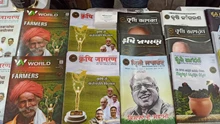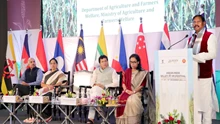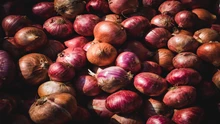
Each February we celebrate President's Day, originally known as George Washington's birthday. This day was designed to honor America's first president on his birthday, but has since come to be known as a holiday to celebrate all presidents and the great work they have done for our country.
You may have heard about a little initiative the White House took on in 2015 to protect and promote pollinator health. Understanding the importance of the humble honeybee and other insect pollinators, President Obama put together an interagency task force to create a strategy for the promotion of pollinator health.
In case you were wondering just how important honey bees are to our ecosystem, consider this: about one-third of the U.S. diet is derived from insect-pollinated plants and honey bees are responsible for about 80 percent of that process. That's right, one-in-three bites! We can all thank honey bees for our favorite fruits, vegetables and nuts, like apples, almonds, watermelon, cucumbers and avocados. Did you also know that because of their pollination work, honey bees alone add more than $15 billion in agricultural value each year? So yes, honey bees, and all insect pollinators, are pretty important to our way of life, and we are so excited to see them get the attention they deserve.
In honor of this great work done by the Obama administration and all of our great presidents throughout history, we thought it would be fun to share some sweet facts about our nation and its relationship with the humble honey bee.
George Washington is said to have been a big fan of honey and enjoyed it in his tea and was quite fond of covering his hoecakes with a reasonable drizzle. Both fans of gardening, and understanding the pollination performed by honey bees, Presidents George Washington and Thomas Jefferson both kept bees on their estates. There are still bees kept at Mount Vernon, and you can learn all about them here. According to records at Mount Vernon, George Washington is thought to have been among the first to keep his bees in wooden boxes, as opposed to the traditional black gum hives.
Thomas Jefferson wrote about the origins of honeybees in his nature book, Notes on Virginia.
Martha Washington is said to be quite the fan of rose-flavored honey (honey boiled with rose petals).
You can find the recipe in Tammy Horn's book, Bees in America: How the Honey Bee Shaped a Nation. Have you heard about the "Bees that Saved America?" It is quite the tale, and you can read about it here.
According to our friends at Historical Honeybee Articles, Abraham Lincoln is rumored to be "very fond of honey."
In 2009, Charlie Brandts became the first official White House beekeeper when he installed a hive of nearly 70,000 bees near the garden on the South Lawn. He retired from government in 2012, but is still on-hand to maintain the hive.
In its first three years, the presidential hive produced 340 pounds of honey that has been given out as gifts, used to make beer and in both daily and formal meals at the White House.








